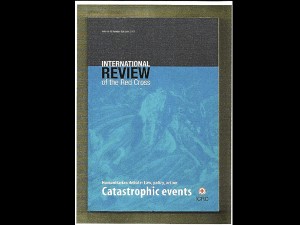Human dignity amid catastrophes

Are these natural disasters or are these man-made – in the sense that Mother Nature is taking revenge on the reckless actions of humans, denuding forests, clogging drainage systems, and contributing to the thinning of the ozone layer due to unabated pollution?
This book, “Catastrophic Events – Humanitarian Debate: Law, Policy, Action,” is a thought-provoking review of natural and man-made catastrophes that happened around the world. It must be quickly added that the Pedring disaster may not still qualify as a catastrophe.
Credible dictionaries agree that a “catastrophe is a large-scale, sudden and disastrous event that causes widespread death, destruction and suffering.
The book says, “History is replete with famous catastrophes, including devastating military conflicts, decimating disease epidemics and destructive natural disasters. Industrial and technological revolutions created the potential for man-made catastrophes involving accidents to expose populations and ecosystems to harmful substances.
Mentioned in the book was the chemical accident in Bhopal, India in 1984; the nuclear accident at Chernobyl in the Soviet Union in 1986.
Elsewhere in the book is the atomic bombs that were unleashed against the cities of Hiroshima and Nagasaki (including eyewitness accounts on unimaginable destruction and suffering).
This book is not your usual leisurely morning reading. It deals with a reality as compelling as the next CNN broadcast of the bombing of the twin towers and of the World Trade Center in New York – which shocked all of us for its daring and its magnitude – even depth of suffering.
The book speaks of the coverage of this Review: “Natural disasters such as hurricanes, earthquakes, tornadoes, floods or wildfire come in hand in hand with man-made hazards such as transport accidents or environmental disasters due to technological failures or, worse still, attributable to sociological hazards with a strong human motivation, in particular in situations of armed conflict and collective violence where political, economic and military interests collide.”
It features thoughtful articles of scientists and policy makers around the world confronting the issue of catastrophes as an act of revenge by Nature or as triggered by human folly through wars that we are now familiar with.
The fact that the International Committee of the Red Cross has devoted a thorough discussion of catastrophes – and our responses to them – show the concern for human beings around the world. They are always caught in the crossfire of warring states or parties.
What is striking here is the seeming acceptance of the inevitability of these catastrophes, even the man-made ones – and we are just reviewing countries’ capacity to make a response.
Thankfully, Red Cross and other international organizations care enough to develop a response, which is getting better each time:
“Human vulnerability, caused by the lack of risk management and planning, the lack of appropriate emergency management or the unexpectedness of the event, leads to human, financial and structural losses. The severity of such losses depends on the capacity of the population to withstand the disaster – their resilience.”
Two issues emerge from the discussion of humanitarian response – the tug-of-war between human rights and security.
And yet security consciousness always wins out: “Framing an issue as a security threat can lead to more political attention, economic resources, and policy action leads to “securitism” as contrasted to dealing with a catastrophe as a humanitarian issue.”
The securitization of health and disaster relief reflects not only greater awareness of the damage and catastrophe events could inflict on societies, but also a normative shift with respect to creating incentives for governments, international organizations and non-state actors to take more vigorous action.
But nations have been wary of exposing their sovereignty to foreign humanitarian relief efforts without retaining as much control as possible over such efforts.
At the heart of the securitization of health and disaster relief in the context of catastrophes is the objective of convincing states to improve national capabilities, strengthen international cooperation and develop resilient, sustainable governance strategies and capacities for catastrophic events.
The book also extensively discussed the nuclear threat that confronts Planet Earth – and the real urgent need for nuclear disarmament.
“Today there are an estimated 27,000 nuclear warheads, and nations have emerged which are trying to bolster their ‘security’ and strengthen their negotiating power through possession of such weapons,” says the book, making the nuclear threat even more imminent.
The pained question remains: Will the disasters of Hiroshima and Nagasaki continue to act as a deterrent for the possessors of nuclear weapons, forcing them to give up the idea of actually using them?
Or will it serve the opposite purpose? Could it in fact be possible that making people aware of the “prompt and utter destruction” caused by nuclear weapons might tempt some military planners into actions that would confirm our worst fears?
What can be done? The fourth Geneva Convention specifically calls for free passage of “medical and hospital stores and objects necessary for religious worship as well as food and other items if the latter are specifically destined for children, expectant mothers and maternity cases subject to search and to assurances against diversion and misuse.”
This Review is for policy planners who must confront the realities of catastrophes in making the world over. It also demonstrates the durable hope of organizations like the Red Cross and others who continue to speak for the human dimension of every situation.
I am reminded of a line from William Faulkner who said that “when the last ding-dong of hope fades out, there is still that one inexhaustible voice speaking. The human voice.” This time that voice comes from an international humanitarian organization. Let there be more organizations emerge, and so affirm human dignity – and survival. (dmv.communications@gmail.com)